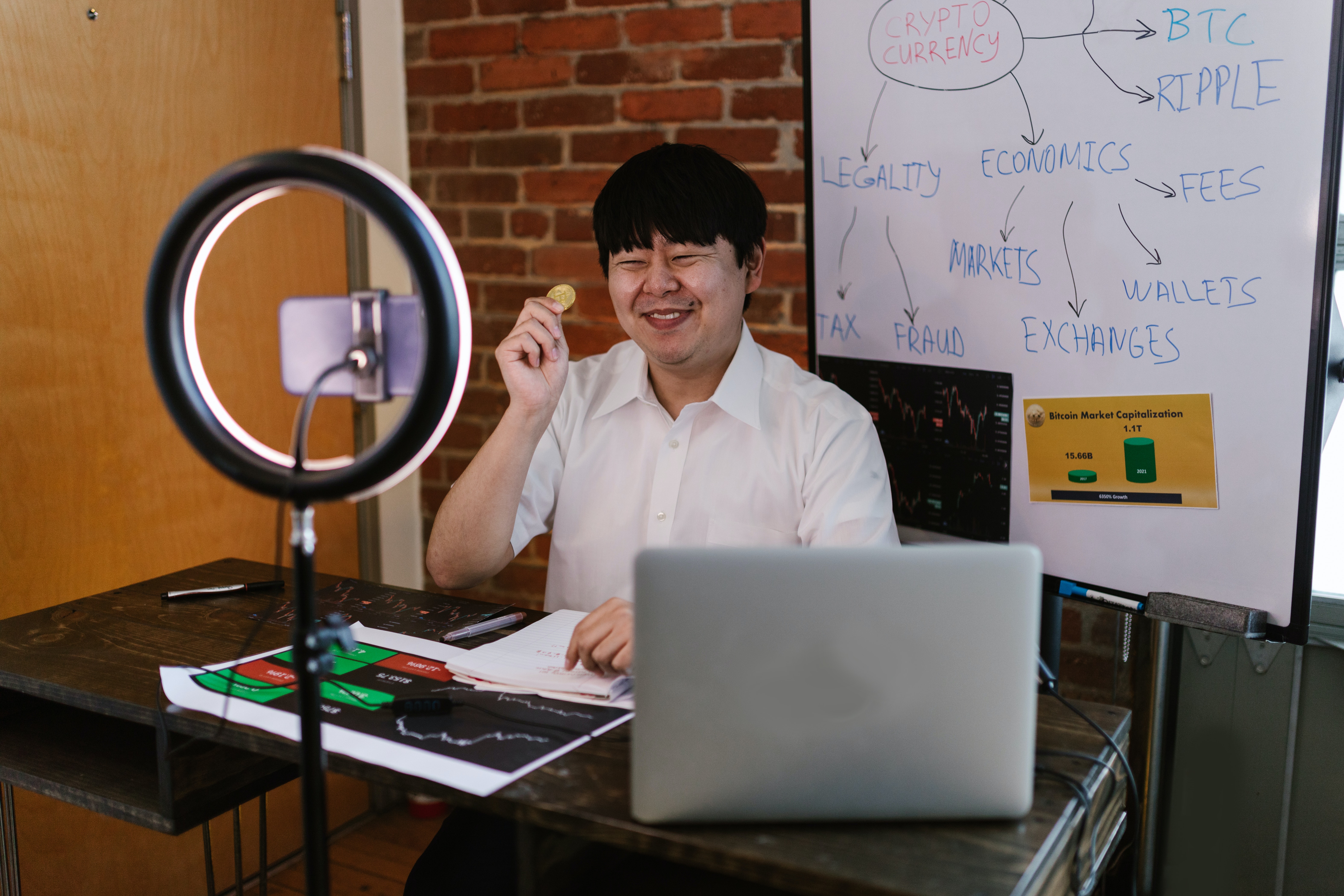Paradise lost? How Taiwanese crypto businesses are fighting the bear

Source:shutterstock
The crypto market is imploding all over again. Trillions of dollars have fled the space in mere months. Yet despite regulatory pressure and a conservative customer base, many crypto businesses in Taiwan see no reason to panic. What keeps them bullish while facing the bear?
Views
Paradise lost? How Taiwanese crypto businesses are fighting the bear
By Alex Rednaxelaweb only
Crypto prices are in meltdown. Apocalypse plagues the coin news headlines. People are asking Google is bitcoin dead more than ever before.
Bitcoin might not be dead, but the same cannot be said for 2021’s crypto-mania, buried now in a dismal macro-economic outlook, aggressive global interest hikes and the $40b wreckage of collapsed crypto ecosystem Terra Luna. Reports of suicide have accompanied the trillion dollars wiped from the crypto market cap since April.
Depending on who you ask, we are now either heading towards or already deep within the latest crypto recession - or “bear market.”
The “bear” is famous for knocking out crypto projects like so many hapless salmon. According to obituary aggregators DeadCoins and Coinopsy, over 1000 crypto projects vanished in the first year of 2018’s bear market alone. We have yet to see a wholesale capitulation at that scale in 2022, but as renowned bitcoin bull Mike Novogratz keeps saying: the pain is still young.
In Taiwan, a series of high profile scams have further tested investor confidence in the sector. At the end of 2021, Taiwan’s Criminal Investigation Bureau arrested 14 members of a crypto fraud syndicate who stole almost $6m in assets. Last month, Thai police took 6 Taiwanese natives into custody on charges of crypto fraud and identity theft. The group were part of a larger trend towards “pig-butchering” scams targeted at the Chinese speaking world - and Taiwan in particular.
 Many Internet celebrities were used to attract the audience for crypto projects (Source: Pexels)
Many Internet celebrities were used to attract the audience for crypto projects (Source: Pexels)
This all follows a dubious boom in late 2021 of vacuous and repetitive crypto projects ranging from genuine Ponzis to simply overhyped and ill-fated NFT collections. As Taiwanese YouTuber Zamy recently pointed out, many of these “projects” abused the vibrant culture of internet celebrity on the island to reach a young, trusting audience.
As co-founder of Cream Finance Leo Cheng observed, the Taiwanese population at large are “very, very conservative.” It seems plausible, then, that many in Taiwan would take away just one lesson from the experience of boom-crash and scams-galore in 2021-2022: crypto is not safe.
Yet little of this apparent doom and gloom coloured our interviews with the diverse crypto businesses here in Taiwan, most of whom seem to perceive the impending quiet of a new bear market more as opportunity than apocalypse.
 Michael Ou (Source: Zhou-Qi Wu)
Michael Ou (Source: Zhou-Qi Wu)
For Michael Ou, CEO and Founder of CoolbitX, “current market condition[s]’ will likely create a growing need for “users… to transfer their assets to cold wallets for self custody” - a gap his company are well-placed to fill as manufacturer of “the world’s first mobile hardware wallet.”
Denise Weng, PR Representative at Taiwan’s largest crypto exchange Maicoin, said that the company will utilise the bear to “optimise operations, interfaces, products and services”.
Hana Chang, head of operations at indigenous DeFi darling Perpetual Protocol, reflects similar sentiments. Without the bull’s “extreme competition” and “excess resources,” she says, the team can move focus from “hustling and marketing” back to “developing the product.”
Sei, project manager for upcoming ‘GameFi’ (the catch-all term used for video games connected to a blockchain) project Freeport, works at a blockchain company of around 20 employees. He said they began to observe “quite a gap” in user engagement from the first half of 2022 that became “especially obvious in the last month” as the wider market buckled.
Yet unlike their experience in the previous bear market, a steady stream of new users has “continued to trickle in,” particularly to their latest product ‘NFT Maker - Gaia,’ an “all-in-one” platform for artists to launch NFT collections without technical knowledge.
Internationally, GameFi and NFTs have suffered more than other sectors, but as Sei reports, buyers in Taiwan remain “relatively optimistic,” with NFTs continuing to post solid trade volume across the board.
Among the growing number of crypto media outlets in Taiwan, CryptoCity focuses specifically on coverage of these two new sectors. Founder Lex Yeh also finds cause for optimism - his “traffic is slowly picking back up” as the market stabilises.
The sense that this bear is far less ferocious than its predecessor resurfaces as a recurrent theme. Ou’s suggestion that the market is “more mature” than ever before is supported by the “relative stability” of trade and registration volume at Maicoin. In fact, data from Coingecko suggests no reduction in average volume at all across the past year.
Daily volumes at many overseas exchanges have fallen up to 50%. Of course, Maicoin’s absolute numbers are still below those competitors, but its sustained volume underlines the continued interest of Taiwanese investors in crypto.
Of course, there remain many barriers to crypto adoption in Taiwan. Anti-money laundering regulations for crypto entities introduced in July 2021 caused 3 of 8 affected exchanges to cease operations entirely. Weng predicts that the arrival of more regulatory pressure in the coming years will further “increase operating costs” for crypto businesses on the island. Local crypto lawyer Will Tseng says that he often advises clients to forget Taiwan entirely and start their venture in Singapore instead, where regulation is clear and already mature.
 (Source: Pexels)
(Source: Pexels)
Yet after talking to the spread of crypto businesses already operating here, it’s difficult not to come away with an old crypto cliche ringing in your years: bear or not, we are going to make it. For now, the focus is on growth: Maicoin will “continue to invest resources to educate the market and users,” CoolbitX are looking to “cultivate talents,” CryptoCity perceive an “opportunity to… improve coverage [...] and expand [their] market” while the Freeport team are determined to “just keep working hard on [their] own projects.”
As Chang points out, the nation is teeming with crypto talent - several members of the Ethereum Foundation (arguably the most respected team in the industry) are Taiwanese. Further, China’s “intense repression” of the sector in recent years has “indirectly provided Taiwan a powerful advantage” as mainland users flock to “decentralised platforms” like her own Perpetual Protocol.
The bear seems to offer just the breather needed to lean into this advantage.
Maicoin will “continue to invest resources to educate the market and users.” CoolbitX plan to “cultivate talents.” CryptoCity perceive an “opportunity to… improve coverage [...] and expand [their] market.” Perpetual Protocol are looking to “consolidate their community and improve… retention”. The Freeport team are determined to “just keep working hard on [their] own projects.”
Amidst market chaos, there is stability in talent and creativity. Just as bitcoin is not “dead,” so the spirit of Taiwanese entrepreneurs pursuing innovation in difficult circumstances is very much alive.
About the Author
Alex Rednaxela is an intern writer and filmmaker at CommonWealth English, you can find him at his website www.aoniandregs.com
Have you read?
- Meet Taiwan’s “Phygital” Mavericks
- Taiwan’s new Web3 upstarts
- Lessons from first fatal highway accident in Taiwan involving assisted driving
Uploaded by Ian Huang






